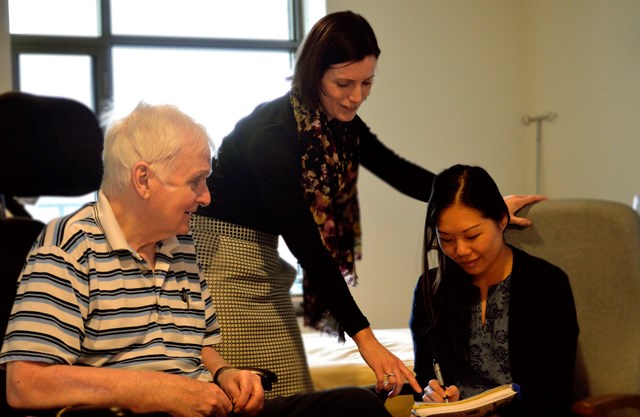The culture of quality improvement at #Runnymede Healthcare Centre has inspired the creation of a #pharmacy initiative that is receiving national attention for enhancing patient-centred care and safety. The Canadian Society of Hospital Pharmacists (CSHP) recognized the Runnymede model as a best practice, and the hospital’s pharmacy team was invited to present its initiative at the CSHP Professional Practice Conference in February, 2016.
The initiative fosters frequent and highly personalized reviews of patients’ regimens by partnering Runnymede’s pharmacy team with students from the University of Toronto’s Faculty of Pharmacy. The process strengthens safety by ensuring patients receive only the #medications they absolutely need, and the students benefit by gaining an enriching learning experience.
The risks of over-prescription
Before their admission to Runnymede, medically complex patients are often treated by multiple physicians, for different health issues. As patients transition from one level of care to another (e.g. acute care to home care, etc.), the number of medicines they are prescribed can add up – regimens sometimes consist of more than 20 different medications.
Such a large number of prescriptions can result in negative side effects or drug interactions, which could cause patients to be admitted to hospital. Over-prescription is also linked to an increased risk of confusion and falls, which is the leading cause of injury-related hospitalizations among Canadian seniors, according to a report from the Public Health Agency of Canada.
Collaborative Comprehensive Medication Reviews
Through the development of an innovative Comprehensive Medication Review (CMR) guide, Runnymede’s pharmacy team performs medication assessments that augment already-existing checks that are in place at the hospital. The CMR guide facilitates a thorough review of a patient’s current medical history and drug therapies, to help evaluate the risk of drug interactions.
Based on the outcome of a CMR assessment, the pharmacy team makes recommendations about whether certain drug dosages might be adjusted to strengthen symptom management and pain control. Other drugs could even be recommended for discontinuation from the patient’s regimen altogether. The team works collaboratively with physicians to ensure that any changes to medicines are safe and patient-centered.
“The pharmacists work in close collaboration with other healthcare professionals at the hospital to ensure the most appropriate medications are provided to our patients,” said Luba Kelebay, manager of pharmacy and allied health at Runnymede. “Our team saw an opportunity to enhance our medication review process and further contribute to patients’ safety.”
Incorporating student resources
A further innovation with the CMR initiative is the way it involves Runnymede’s pharmacy students from the University of Toronto. Before coming to the hospital, the students are prepared with specialized training in geriatric medicine, and this focused skill set was recognized as a valuable asset. “With our guidance, students conduct comprehensive reviews of patient charts and make evidence-based suggestions on how their medication use could be enhanced,” said Hilary Rodrigues, Runnymede’s professional practice leader – pharmacy. “They also talk with the patients and clinical staff to learn about the patients’ treatment goals and values, which can help inform the recommendations that we make.”
A win for everybody
The CMR initiative has been a great success, with physicians at Runnymede implementing more than three-quarters of the pharmacy team’s recommendations. After the team’s February presentation at the CSHP Professional Practice Conference, a number of peer hospitals expressed interest in setting up collaborations to help with developing similar systems at their own pharmacies.
“Our initiative is a win for everybody,” says Kelebay. “Patients are safer when we optimize their medications; we lower hospital costs when unnecessary medications are removed and pharmacy students get a very valuable learning experience while they’re here.”




